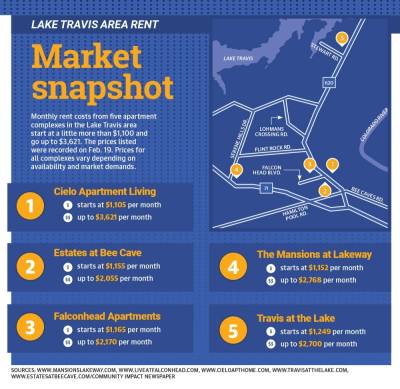“We struggle with lack of applications, high turnover of employees and a lack of reliable workers,” Kelley said. “From our research this affects the service and retail industries the most.”
Long lines, cold food, high turnover and slow service are all symptoms felt by communities experiencing staffing problems, Kelley said. As one example, she talked about the now closed restaurant in Bee Cave called Wild Kitchen and Bar.
Before it finally closed in August 2019, Wild went through four chefs and had little to no kitchen help and experienced a high turnover of servers coming from as far as Round Rock and Bastrop, Kelley said.
During her presentation at the Sonesta hotel, Kelley offered several solutions to Bee Cave’s staffing issues. Those included getting more teenagers to work, finding transportation for those who commute to the area, creating affordable child care for working parents and bringing in attainable workforce housing,
Trying to fix a lack of affordable housing
Many officials throughout the Lake Travis area identify affordable housing as a primary driver for staffing issues, and Laura Mitchell, president of the Lake Travis Chamber of Commerce, has been working on finding a solution for more than a year.
One of her most prominent initiatives involved speaking with local apartment complex owners to gauge interest in establishing blocs of apartments for cheaper than their normal monthly rents.
At first, Mitchell was optimistic, telling Community Impact Newspaper in March 2019 that complex owners she had so far spoken with seemed open to the idea.
The project continued showing momentum into September, with Mitchell gaining ground with at least one complex called Avanti Hills in the Hill Country Galleria.
Mitchell’s talks with representatives of Avanti Hills evolved into the potential expansion into Lakeway and Bee Cave of a preferred employer program that offers a small monthly discount and an adjustment on move-in fees.
At the time, Avanti Hills representatives had entertained the idea of expanding that program to include service industry workers, but in February, Mitchell confirmed the discounts local complexes were able to offer ended up not being impactful enough for hourly service and retail workers, so the project did not move forward.
Affordable housing has proven a difficult pitch in cities such as Lakeway, Mitchell said, referring as one example to a Nov. 18 proposal to City Council from Cherry Knoll LLC for Tacara at Lakeway, a multifamily housing development that would have been on about 22 acres on Flint Rock Road near the city’s medical district.
A letter from Land Strategies Inc., a firm representing Cherry Knoll LLC, stated Tacara at Lakeway would be a valuable addition to the city mainly due to housing and traffic benefits.
“The project will provide an appealing option for Lakeway community members who may not be able to afford high-income homes, such as young adults, service workers, or workers at the adjacent hospital,” the letter states. “By providing workforce housing, the project should alleviate traffic on RM 620 and other thoroughfares.”
Council voted that proposal down, but there was also a vocal contingent of Lakeway residents living in the Flintrock Falls development, near what was to be Tacara at Lakeway, who voiced their opposition during the November meeting.
Several people spoke against the multifamily development, and one Lakeway resident submitted a letter of protest to the city in advance of the Nov. 18 meeting.
“And why should a rezoning request be granted?” one resident wrote in a letter. “Presumably because the developer can make more money. How is that justification for a zoning change? The developer, Cherry Hill LLC, will build, sell and go home. But my home is right here.”
Even if there was no resident opposition to the development, council members argued Tacara at Lakeway was not a good fit for the area where it was proposed and stated they want to wait for completion of the city’s comprehensive plan, a massive 10-chapter document that lays out a pathway for Lakeway over the next 20 years due for adoption by April, before making any more land-use decisions based on housing density.
That is one situation Mitchell points to as an indicator of why it is difficult to create affordable housing in the area.
During the chamber luncheon at the Sonesta, Andrea Willott, a Bee Cave City Council member, also implored business owners present to be more participatory in local government, stating officials need to hear firsthand from citizens that action is needed.
“We need you to come and speak on behalf of your businesses to the City Council and say that we need workforce housing,” Willott said. “You have no idea how much your comments mean when you come to a City Council meeting.”
Affordable housing on the way
Many officials throughout the Lake Travis area identify affordable housing as a primary driver for staffing issues, and Laura Mitchell, president of the Lake Travis Chamber of Commerce, has been working on finding a solution for more than a year.
One of her most prominent initiatives involved speaking with local apartment complex owners to gauge interest in establishing blocs of apartments for cheaper than their normal monthly rents.
At first, Mitchell was optimistic, telling Community Impact Newspaper in March 2019 that complex owners she had so far spoken with seemed open to the idea.
The project continued showing momentum into September, with Mitchell gaining ground with at least one complex called Avanti Hills in the Hill Country Galleria.
Mitchell’s talks with representatives of Avanti Hills evolved into the potential expansion into Lakeway and Bee Cave of a preferred employer program that offers a small monthly discount and an adjustment on move-in fees.
At the time, Avanti Hills representatives had entertained the idea of expanding that program to include service industry workers, but in February, Mitchell confirmed the discounts local complexes were able to offer ended up not being impactful enough for hourly service and retail workers, so the project did not move forward.
Affordable housing has proven a difficult pitch in cities such as Lakeway, Mitchell said, referring as one example to a Nov. 18 proposal to City Council from Cherry Knoll LLC for Tacara at Lakeway, a multifamily housing development that would have been on about 22 acres on Flint Rock Road near the city’s medical district.
A letter from Land Strategies Inc., a firm representing Cherry Knoll LLC, stated Tacara at Lakeway would be a valuable addition to the city mainly due to housing and traffic benefits.
“The project will provide an appealing option for Lakeway community members who may not be able to afford high-income homes, such as young adults, service workers, or workers at the adjacent hospital,” the letter states. “By providing workforce housing, the project should alleviate traffic on RM 620 and other thoroughfares.”
Council voted that proposal down, but there was also a vocal contingent of Lakeway residents living in the Flintrock Falls development, near what was to be Tacara at Lakeway, who voiced their opposition during the November meeting.
Several people spoke against the multifamily development, and one Lakeway resident submitted a letter of protest to the city in advance of the Nov. 18 meeting.
“And why should a rezoning request be granted?” one resident wrote in a letter. “Presumably because the developer can make more money. How is that justification for a zoning change? The developer, Cherry Hill LLC, will build, sell and go home. But my home is right here.”
Even if there was no resident opposition to the development, council members argued Tacara at Lakeway was not a good fit for the area where it was proposed and stated they want to wait for completion of the city’s comprehensive plan, a massive 10-chapter document that lays out a pathway for Lakeway over the next 20 years due for adoption by April, before making any more land-use decisions based on housing density.
That is one situation Mitchell points to as an indicator of why it is difficult to create affordable housing in the area.
During the chamber luncheon at the Sonesta, Andrea Willott, a Bee Cave City Council member, also implored business owners present to be more participatory in local government, stating officials need to hear firsthand from citizens that action is needed.
“We need you to come and speak on behalf of your businesses to the City Council and say that we need workforce housing,” Willott said. “You have no idea how much your comments mean when you come to a City Council meeting.”
There is one affordable housing complex underway in the Lake Travis area north of Lakeway in the Austin extraterritorial jurisdiction on RM 620. Meg and Kent Conine are developing the 180-unit complex called the Villas at Lakeway Apartments that will cater to those making 60% of the Greater Austin area’s median income. Meg Conine said depending on qualification requirements, tenants could earn anywhere from 30% to 80% of the median household income for the Greater Austin area, which in 2019 was $95,900, to qualify for residency.
The Conines have been working in the affordable housing industry for more than 15 years, and Kent Conine was previously a board member for the Texas Department of Housing & Community Affairs, which administers the housing tax credit program throughout the state of Texas.
“We do try to cater to the policemen, the firemen, the nurses, the teachers and your retail workers, because they can’t afford to pay what the current price is,” Meg Conine said.
Information Meg Conine provided shows projected rent for a studio apartment in the Villas at Lakeway Apartments will be $830. A one-bedroom apartment will be about $900; average rent for a two-bedroom will be $1,089; and a three-bedroom apartment at the complex will be $1,249.
Information Meg Conine provided shows projected rent for a studio apartment in the Villas at Lakeway Apartments will be $830. A one-bedroom apartment will be about $900; average rent for a two-bedroom will be $1,089; and a three-bedroom apartment at the complex will be $1,249.
That price range represents a significantly lower monthly cost than in standard apartment complexes in the Lakeway and Bee Cave area. As of late February, prices at five major complexes for one-bedroom up to three-bedroom apartments in the Lake Travis area ranged from a little more than $1,100 and went up to $3,621, according to information from each complex.
“This project will only be 180 units, but it’s 180 units that aren’t there now,” Meg Conine said.
The Conines said they hope the Villas at Lakeway Apartments will bre
"I'm trying to give myself enough room to deal with the labor problem that the whole construction industry is dealing with right now, and it is acute, I can tell you." Kent Conine said. "Projects like this that used to take 18 months are now taking 24 months."
Continued effort to solve the problem
As more and more Lake Travis-area officials and leaders in the business community network and come together to find solutions, Mitchell said she views that as a step in the right direction. Lakeway officials will soon receive a complete comprehensive plan, which will serve as an extensive guide for all facets of the future of Lakeway, including its local economy, and Meg and Kent Conine said they are hoping t
As more and more Lake Travis-area officials and leaders in the business community network and come together to find solutions, Mitchell said she views that as a step in the right direction. Lakeway officials will soon receive a complete comprehensive plan, which will serve as an extensive guide for all facets of the future of Lakeway, including its local economy, and Meg and Kent Conine said they are hoping t
"We have spoken with staff in the city of Bee Cave, and they have been very encouraging," Meg Conine said. "We looked at several sites and have not been able to settle on one yet. We've also met with Sandy Cox, the mayor of Lakeway. Same thing—she has been very encouraging."
The Conines also are working on the site plan for a Phase 2 of the Villas at Cardinal Hills, which could contain another 180 units.
Mitchell said she and Bee Cave City Manager Clint Garza had a productive meeting in mid-February on staff recruitment and retention in the Lake Travis area and said she plans to reach out to Kelley to pursue further solutions.
“I think what’s really great is that we’ve come a long way from people not being willing to discuss it, to not only being willing to discuss it, but realizing it is a very critical issue,” Mitchell said. “And that’s huge.”
Editor's Note: This is part one of a two part series on staffing issues in the Lake Travis area. Part two will focus more on transportation for commuting workers.
“I think what’s really great is that we’ve come a long way from people not being willing to discuss it, to not only being willing to discuss it, but realizing it is a very critical issue,” Mitchell said. “And that’s huge.”
Editor's Note: This is part one of a two part series on staffing issues in the Lake Travis area. Part two will focus more on transportation for commuting workers.









